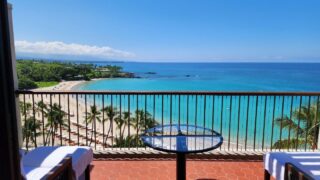A new California law will have a ripple effect on all Hawaii accommodations starting in just over one month. (Hat tip to Renee on our site for mentioning it). California Assembly Bill No. 537 is noteworthy, especially for Hawaii-bound visitors from California (and elsewhere). This bill, which was passed in October 2023 and takes effect from July 1, 2024, targets transparency in advertising rates for short-term lodging:
“A place of short-term lodging, an internet website, application, or other similar centralized platform, or any other person shall not advertise, display, or offer a room rate, as defined in Section 17561, that does not include all fees or charges required to stay at the short-term lodging except taxes and fees imposed by a government on the stay.”
California Assembly Bill 537.
Visitors from California make up the largest segment of Hawaii tourists. This bill will not just impact them but also everyone. The reason is that while it is intended for California residents, it won’t be easy to create different rules for different segments of visitors who are reserving online. For that reason, we expect this to have a much wider-ranging impact on Hawaii hotel and vacation rental websites. Following is a brief overview of some of the bill’s implications.
Transparency in pricing is a good thing. It helps all visitors better budget their trips without unexpected costs, making the travel planning process smoother and more reliable.
“We’ve found ourselves tangled in the maze of booking Hawaii hotels and vacation rentals more times than we can count. A seemingly great deal can quickly sour when unexpected fees like cleaning, management, and resort charges are tacked on, turning a good price into a bad one. It’s worth noting that the law does not also require that taxes (18% in Hawaii) be shown in advance of the final booking. In any event, this is a big improvement for the benefit of Hawaii visitors and Hawaii residents when traveling.”
Beat of Hawaii
Impact on Hawaii accommodations from California Assembly Bill No. 537.
1. Requirement for comprehensive rate inclusion: The bill will mandate that all advertised room rates for short-term lodgings, including hotels, motels, and vacation rentals, include all fees and charges, excluding government-imposed taxes and fees.
This impacts anyone in California, whether they are making reservations in Hawaii or elsewhere. It will ensure California consumers see the full cost of their Hawaii vacation accommodations upfront. It intends to prevent misleading advertising that obfuscates additional fees until further down in the booking process.
The requirement for transparency occurs when visitors from California (and likely elsewhere) specify dates in an accommodation search.
2. Associated enforcement and significant penalties: Since this applies to anyone selling to Californians, violations of the law can result in civil penalties of up to $10,000 per violation. We expect to see enforcement actions brought by various sources, including city attorneys, district attorneys, county counsels, and the California Attorney General.
Hawaii hotels and Hawaii vacation rental companies need to take note.
Being aware of these regulations is now crucial for Hawaii’s hotel and short-term rental owners. In six weeks, California travelers already familiar with transparent pricing at home can expect the same clarity when booking accommodations in Hawaii. Business owners and managers in Hawaii will need to consider adopting appropriate practices to meet these legal expectations and enhance booking competitiveness.
This upcoming change aligns with broader consumer protection trends aimed at eliminating “junk fees” and promoting more honest advertising in the travel industry.
Do you value legislation to increase transparency in Hawaii accommodations? What has your experience been with finding excessive fees tacked on?
Bill-Text_-CA-AB537-_-2023-2024-_-Regular-Session-_-Chaptered-_-LegiScanGet Breaking Hawaii Travel News







Aloha.
My family and I’ve been to 2 hotels with Waikiki Beach Walk Relax and spend 3 nights in Honolulu In September and 5 nights at Kona Reef Resorts in September to October.
Aloha🤙🤙🤙😉
Consumer protection is a good thing. Those saying people should read through the details I ask why should they have to?
Not exactly the same but Marriott has on their site room rates with or without taxes and fees, with a toggle switch. I find it helpful, especially for budgeting.
Of course, we should read the details. But we usually don’t. That’s on us when we get hit with a surprise.
Why check – I am just thinking about the simple things: what is the check-in time and check-out time for this reservation? Some hotels offer noon check-in; for others, it’s 2, 3, or even 4 pm. Shouldn’t we want to know that? Is there an on-site restaurant – what are the hours?
I love Hawaii and I believe that Hawaii should make laws to keep their land as sacred as possible. To keep rules and requirements for renting as they should be.
We travel to the islands every couple of years and want to keep coming as much as possible. We own a timeshare and do not want to lose the privilege of losing it because of the other people that do not abide by the rules.
Hawaii has a lot of sacred grounds a culture and I follow their beliefs. I would not desecrate any of them. ♥️
I work at a hotel in waikiki. I brought up the issue of Resort fees being essentially Hidden Fees to the director of the front office. Their response was “everyone does it”. This was around 10 years ago. Here we are today (finally) with some clarity for the vacationers who help our island survive.
I ve noticed lots of extra charges being tacked on to my reservations all over, since COVID. Why are we paying cleaning costs. I also have a timeshare which I’m wandering how that will be effected
While it could be harder for higher-fee accomodations to compete in some case, this would be an incredibly beneficial change. Wish it could apply across the entire country, and in a broad variety of areas of business.
We are California residents and own a Maui condo. I’ve been researching this new California bill and cannot find anywhere that the law applies to California residents vacationing in Hawaii. We use VRBO and Airbnb which breaks down all fees prior to the final booking process. Full transparency.
Aloha
We own a few weeks of a timeshare on Kauai paying property taxes as part of annual maintenance dues. Please explain why we also pay occupancy tax on our weeks. This tax has regularly increased and on mainland is only paid by renters and Not paid by owners using their property. Malaho for your detailed response
Another stupid regulation trying to save people from their own dumbness too lazy to read all disclosures, etc. After 25 plus Hawaii vacations we have never had an issue with that. But what else would someone expect out of California?
This new California law is one more step for government to be involved in your life. When you travel you book a room and ot tells you what additional fees are added like parking and resort fees. Why can 1 state dictate how the travel industry runs its business. And why are taxes not included. Taxes are the one thing needed because the other fees are disclosed. The added taxes are just as ridiculous as parking fees.
About the taxes: For what it’s worth, when I booked a room at an IHG hotel in California yesterday, I could click on a box above the listed price to “show taxes and fees”. I looked at a similar hotel in Hawaii and with a slightly different format, the same box is available to show the taxes. This will become standard everywhere soon.
” it won’t be easy to create different rules for different segments of visitors who are reserving online”
VRBO, Air BnB etc already do this for some markets, as a Canadian, if I search for a vacation rental through their sites I see the per diem and the total cost of the visit, including taxes and fees as a summary. Makes it really easy to spot the true cost.
Here in California the state is running a $75 billion deficit, we’re paying 6 bucks for a tank of gas, and 2 bedroom apartments are going for $3000-4000 a month. Don’t our state legislators have more important things to worry about?
The transparency of fees is always a good thing for consumers. A trip here to Hawaii, should always be enjoyable without hidden costs. However with the fazing out of short-term vacation rentals, fees imposed by the resorts can also be explained if you call the for a breakdown before completing your reservation. Good move for tourism and local residents to not be hit with hidden fees
I need more proof that a Californian law can apply to people not living in California. As far as I understand law, this California law only applies to STR owners who live in California. However, an interesting side point is that many of the STRs here in Hawaii are owned by mainland people, probably a lot in California. I think the law could apply to these owners.
How convenient! The government imposed taxes are exempt. If you get a STR for $400 per day, ( good luck finding one) and on top of all the other fees you have to add on nearly $100 per day for all the government imposed taxes, that is not insignificant. I assume the reason for that is they can change it whenever they like or add new taxes on a whim. And they wonder why return visitors are no longer returning!
I think it is a great idea! Why not be transparent?
The information that I read on another site said that SB 478 and AB 537 apply just to California. It will be interested to see how everything works out.
Will be interesting if the hidden hotel fees show up or if enforcement will just be directed at VRBO, AirBnB, STRs?
I have noticed that I see this transition already when using some of the hotel sites (Hilton for one). Its really nice to not have to “do the math”.
About time! True, it doesn’t include tax which is fine. They don’t include tax on price tags for anything else you purchase so no problem there. But $60 a night resort fee plus anything else they add should be included for everyone, not just California.
Do you really think anyone in Hawaii is ready to start enforcing a California law? Stand by for the battle
It’s not Hawaii that needs to enforce it, it’s the third-party booking sites.
What it does is make those who offer rooms show an honest price. How is that not welcome?
The scam practice of charging $60 “resort fee” at the end is B.S. It’s not a resort fee, it’s the cost of the room. Mandatory if you use anything or not. Why be deceitful?
I’ll be there in two weeks! Aloha. 🌴
Larry,
Resort fees. I have a particular dislike for those fees. They should be banned for regular hotels. As far as I’m concerned, to be called a resort it must include these, on site: an 18 hole golf course, a sit fown restaurant with capacity to serve 20% of the hotel guests with no more than a 15 minute wait. And, a gym with pool. The gym must be able to accommodate x number of gym rats without wait. As to the golf course, 2 hotels touching the course would qualify. Otherwise, it’s just a hotel.
This will make rental prices more transparent. Seems Mr. Berman didn’t like all the fees that showed up on his vacation rental pick and decided to make a new law.
Interesting that they excluded government-imposed taxes and fees. “Nothing to see here – Move along, move along…”
Hi Bob.
Not so. When ancillary fees can amount to over 30% of the cost, that’s substantive. Taxes are static at 18%.
Aloha.
“Static” until the next increase. And 18% is not chump change. Let’s say you stay at a $300/night hotel. That’s $378 in room tax for 1 week. We typically stay for 2 weeks.
Hi Rod.
We agree with you. That is not chump change. And we don’t like paying that much any more than you do. Residents pay the same accommodation tax as do visitors.
Aloha.
Thanks BOH.
The taxes might be at the same rate. But, aren’t there discounts on the room rates for local folks?
Mahalo,
Rod
Hi Rod.
Thanks. We’ll address that in an article. We appreciate all of your comments!
Aloha.
Does the hotel know all the taxes expected to be charged at the time of booking?
Seems like they could disclose all taxes and fees at booking, then email the guest as soon as tax laws impact the final price on the booking to let the guest know of the change.
Hi peterparker22
Yes they certainly do.
Aloha.
So you are saying California’s law applies to Hawaii STRs? How is that possible?
Hi Patrick.
It absolutely does. This is about what is presented to people who are in california. Since it won’t be very easy to determine who is actually in California and who isn’t, it’s going to apply to pretty much vacation rentals and hotels across the board.
Aloha
Wow1 So in essence, CA is making law for the entire country?
Hi Patrick.
Perhaps inadvertently.
Aloha.
Hotels can exclude California and not book to them. Good luck.
Why is this law an issue. It makes things transparent instead of deceitful.
Umm, doesn’t excluding the taxes defeat the intent of the legislation? California laws are usually massive overreaches but this one is spot on…except for the tax exemption. Close but no cigar.
They don’t include taxes on the price of anything else you purchase so that’s fine with me.
No, it doesn’t defeat the purpose, because the tax % will be the same regardless which accommodation you choose in your comparison shopping/search, so you will still get the advantage of being able to compare apples to apples. Right now property owners can “game” your search by showing a lower nightly rate but have various fees that are specific to that property that don’t show up until later in the booking process.
I will love being able to truly compare options to one another on a level pricing field!
The 18% room tax is one of the highest cost items when staying in hotels in Hawaii. Not surprising one govt would exempt other govts from the disclosure requirement.
Bingo! California doesn’t want travelers to be reminded of its state and local accommodations taxes, etc. It would be rank hypocrisy for California to require other states to disclose those taxes and not impose a similar requirement within the state.
Taxes aren’t disclosed at the time of sale for almost every product or service out there, so why should it be any different in this situation? Non-disclosure of taxes is not unique to CA.
In the end this offers the consumer greater transparency. IMO CA is forcing a standard that will benefit everyone.